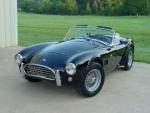 
 Main Menu
Main Menu
|
 Nevada Classics
Nevada Classics
|
 Advertise at CC
Advertise at CC
|
| S |
M |
T |
W |
T |
F |
S |
| |
1 |
2 |
3 |
4 |
5 |
6 |
| 7 |
8 |
9 |
10 |
11 |
12 |
13 |
| 14 |
15 |
16 |
17 |
18 |
19 |
20 |
| 21 |
22 |
23 |
24 |
25 |
26 |
27 |
| 28 |
29 |
30 |
31 |
|
|
|
|
 CC Advertisers
CC Advertisers
|
|

07-24-2005, 08:22 PM
|
|
CC Member

|
|
|
Join Date: Jan 2004
Cobra Make, Engine: BDR 302 AFR 165
Posts: 363
|
|

 Not Ranked
Not Ranked
 holley 715
holley 715
Hey guys,
someone educate me about this carb. It has leman bowls and transfer tubes for something. I have a friend that has one and it looks like its in good shape. I'm sure its off of a 289 car. Is the base plate unique to these carb? Any info on this carb would be appreciated.
Later Dennis
|

07-24-2005, 10:33 PM
|
 |
CC Member

|
|
|
Join Date: May 2001
Location: California,
Ca
Cobra Make, Engine: NAF 289 Slabside Early Comp Car with 289 Webers and all the goodies. Cancelling the efforts of several Priuses
Posts: 6,592
|
|

 Not Ranked
Not Ranked
Dennis:
These are very unique carbs. The main body has different sized venturies for primaries vs secondaries much like the rare 700 cfm Holley. Drop leg boosters, Lemans Bowls (precursor to the current center pivot type). The base plate is similar to other 650-700 vacuum secondary carbs. The attachment point for the linkage is unlike other Holleys though. The small 5/16" diameter transfer tube feeds fuel to the rear bowl since there is only one spot to attach the fuel line on the primary bowl. This tube is the achilles heel for a real stout high winding 289 or one that has had the displacement mysteriously enlarged ie: 331/347(????)
The sizing (715 cfm) is considered by many to be too large for a 289 but since the secondaries are only opened by demand (vacuum) from the engine they work pretty well. They also allowed the modifications done by Shelby to the GT-350 to conform the the SCCA & NHRA rules of the day without major carburetor modifications.
Rick
__________________
Rick
As you slide down the Banister of Life, may the splinters never be pointing the wrong way 
Last edited by Rick Parker; 07-24-2005 at 10:36 PM..
|

07-25-2005, 03:28 PM
|
 |
CC Member

|
|
|
Join Date: Apr 2004
Posts: 1,031
|
|

 Not Ranked
Not Ranked

List 3259 / 3259-1 Holley (700 or 715 c.f.m. depending on which reference you come across)
Great carburetors but not for everyone as they are not easy to get working float levels figured out for applications besides 1965-67 Mustangs. I have worked on many of them for pure stock to 8,500 rpm max effort (never had a fuel delivery problem) engines. The only modifications that I found that made a positive (improve performance at anything close to my 600 feet above sea level location) difference were revised float levels and the timing of the vacuum secondaries.
On an original leaf spring Cobra they just about will not work with the GT350 designed float settings listed in the Holley Variable Specifications Manual. With floats set like a GT350 the carburetors will dribble fuel after the engine is shut down, dribble fuel on any grade any direction, have rich stumble on rough road, rich stumble on hard cornering, surge at cruise, flood the engine out on hard braking, and make hot starts very embarrassing...like a worn out mid 1960s Dodge.
Their Ford applications cousins are the List 2919 for 1964½ 427 High Riser race engines and listed as optional for racing Cobras, Sunbeam Tigers, and 1965 MUSTANG GT350s. The R-2919 is also listed as the racing carburetor for 427 Cobra competition cars. The List 2953 which I think was a 427 SOHC crate engine model. The List 3255 for 1965 427 MR crate engines I believe. And the List 3255-1 as used by some late 427 4V Cobras. I prepared an R-3255 or R-3255-1 (those notes are long gone) for 427 Cobra (I think it was CSX3011.) just before a Bahamas vintage race. It was sent to me because the restoration shop could not get the car out of its own way. They bought the carburetor at high dollars from a national carburetor restorer. I detailed the operation of the carburetor, changed the float levels and tuned the secondary open to what I thought the car might handle. The shop and owner were very happy with the results. I believe the car won its first race with this custom set up carburetor.
Dan
__________________
Dan Case
1964 Cobra owner since 1983, Cobra crazy since I saw my first one in the mid 1960s in Huntsville, AL.
Last edited by Dan Case; 12-13-2019 at 02:10 PM..
Reason: add detail
|

07-25-2005, 06:51 PM
|
|
CC Member

|
|
|
Join Date: Apr 1999
Location: cleveland,
OH
Cobra Make, Engine: CSX4000, 427
Posts: 1,999
|
|

 Not Ranked
Not Ranked
Dan, intereseting comments. I have a 3255-1 that I rebuilt, set the floats (to supplied specs) and installed it in my mustang, but I couldn't get it to run, at all. I thought it may have been way too rich, like you said, dribbling gas into the intake. I am just about ready to send it to somebody.
If you don't mind me asking, how much lower did you set the floats than the listed spec?
__________________
"After jumping into an early lead, Miles pitted for no reason. He let the entire field go by before re-entering the race. The crowd was jumping up and down as he stunned the Chevrolet drivers by easily passing the entire field to finish second behind MacDonald's other team Cobra. The Corvette people were completely demoralized."
|

07-26-2005, 04:02 PM
|
 |
CC Member

|
|
|
Join Date: Apr 2004
Posts: 1,031
|
|

 Not Ranked
Not Ranked

Anthony
Since Holley missed putting in the fuel bowl level inspection sight holes like most of their other fuel bowls, the fuel level in the center inlet (Holley's original term) "LeMans Bowls" is unfortunately trial and error for a particular set of circumstances. Variables of angle to the horizon (on engine), vehicle dynamics is use (chassis stiffness and wheel base affect how the car jostles around), acceleration capability, deceleration capability, cornering capability, steel versus elastomer tipped inlet needles, and fuel pressure can easily confound your efforts to determine what float settings work best.
Power valve ok? I have had brand new ones from Holley I threw in the trash because they were defective in some way. A leaking power valve dumps fuel all the time. You might want to make sure it is functioning correctly first. I have done just two carburetors for Ford guys this year and the valve that came in one kit was worthless.
If you are still having any of the problems I described you are most probably suffering a fuel level too high. High actual fuel level makes driving a car so afflicted miserable. Not knowing any specifics of your application I would recommend lowering the fuel level (raise distance between bowl roof and float top with bowl upside down) 1/32 on which ever chamber you think is having high fuel level. Did this solve the problem? Make any improvement? If not, make the same 1/32 change to the other bowl. Many times lowering the fuel level just 1/32 makes a big improvement all around. There have been cases where it took me 1/16 change to get into a sweat spot. If you have to go farther than 1/16 I would look for some other reason too much fuel is getting to the engine. (Found a small shaving of rubber hose in one 67 390 GT Mustang needle and seat once. Found the pivot pin for one float had completely fallen out in an original 427 Cobra that needed attention after an engine fire. The engine had the 2-4V system. One pin fell out and all hell broke loose. It was a factory defect, the pin had never been staked in by Holley. The fact I found the Holley defect got the insurance company off the owners back. They thought he torched the car for the insurance.)
Dan
__________________
Dan Case
1964 Cobra owner since 1983, Cobra crazy since I saw my first one in the mid 1960s in Huntsville, AL.
|
 Posting Rules
Posting Rules
|
You may not post new threads
You may not post replies
You may not post attachments
You may not edit your posts
HTML code is Off
|
|
|
All times are GMT -7. The time now is 04:23 AM.
Links monetized by VigLink
|


